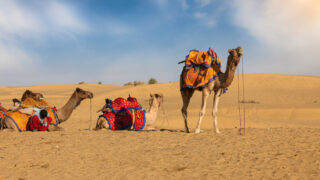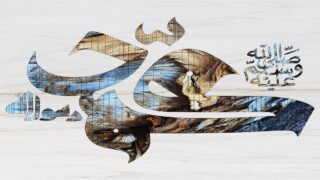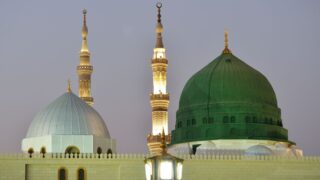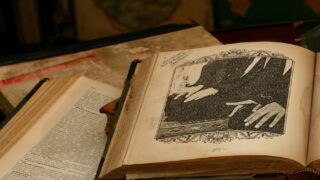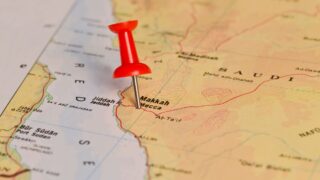Reliance on God, Glory be to Him, does not prevent us from adopting the means, for the believer takes the means out of faith in God and obeying Him in what He commands of taking them, but he does not make the means what create the results, so he relies on them. For Reliance is cutting off the means after setting them up, as he, may the blessings and peace of God be upon him, said: tie it and then, rely on God.
On the side of the means, God Almighty says: “O you who have believed, be on your guard” (An-Nisa: 71). He also says: “Prepare against them what you can of power, including steeds by which you terrify the enemy of Allah and your enemy” (Anfal: 60) and the Almighty said: “And when the prayer has been concluded, disperse within the land and seek from the bounty of Allah, and remember Allah often that you may succeed.” (Al-jumu’ah: 10)
In the aspect of reliance, the Almighty said: “And in God let the believers put their trust” (Al Imran: 122). The Almighty also said: “So when you resolve, then rely on God” (Al Imran: 159). And the Almighty said: “And in God should you rely, if you are believers” (Al-Ma’idah: 23).
The Prophet, may the blessings and peace of Allah be upon him, have taught us in many of his sayings to the necessity of taking the means with reliance on Allah the Almighty, he also call our attention, may the blessings of Allah be upon him, to Tre absence of contradiction in it , from Omar bin al – Khattab may Allah be pleased with him from the Prophet peace be upon him , who said: ” If you really put your trust in Allah, He would provide for you as He provides for the birds. Do you not see that they go out with empty stomachs and come back with full stomachs?“. In this honorable hadith is the urging on reliance, and pointing to the importance of taking by the means by establishing going and coming of birds with God Almighty’s guarantee of sustenance for her.
Acting on the Sunnah of taking by the reasons is at the core of achieving servitude to God Almighty, which is the matter for which slaves were created, messengers were sent, books were sent down for it, and the heavens and the earth were established, and for it were found heaven and hell, so doing the commanded means is pure servitude.
The Noble Qur’an has guided us to adopting the means and guided us not to rely on them alone, but rather to rely on God while adopting them. Therefore, a Muslim must beware of two things in the matter of taking the means:
The first matter: depending and relying on it, trusting in it, hoping and fearing it, this is polytheism that thins and thickens and between that.
The second matter: leaving what God has commanded of the means, and this also may be blasphemy and injustice and between that, but the slave must do what God commanded him of the matter, and put his trust in God with belief that the whole matter is by God’s will, with which he has previous knowledge and judgment. And that the means does not harm or benefit, it does not give, nor prevent, nor eliminate or judge, and whatever happens to the servant is preceded by divine will, and what has been destined for him will not miss him, so he comes with the means as someone who does not see that, there is no salvation, relief and access except with them, and he trusts in God as someone who sees that the reliance does not save him, nor bring him a joy nor lead him to the goal, so he strips his determination to do it out of concern and diligence, and empties his heart from relying on it and depending on it, an abstraction of trust and dependence on God alone. The Prophet, may God’s blessings and peace be upon him, combined these two principles in the authentic hadith, where he says: “Strive for what will benefit you, seek help from God, and do not be incapacitated.” So he commanded him to be keen on the means and to seek help from the means, and he forbade him from being incapable, and they are of two types:
The first type: negligence in the means and lack of concern for them.
The second type: negligence in seeking God’s help and leaving it alone.
The entire religion, outwardly and inwardly, and its laws and facts are under these prophetic words.
To say that there is a contradiction between reliance and taking means is ignorance of the religion, and this is from the lack of knowledge of God’s Sunnah in his creation and command. Definitely, Allah the Almighty created the creation by means and He legislated for them means by which they attain His forgiveness, mercy and reward in this world and the next world, so whoever assumed attaining his aim by mere reliance without the taking the means by which he is commanded by Allah, and that the aims do not rely on the means which Allah Almighty made means, then he is mistaking.
The basic principle is that the servant uses the means that God Almighty has indicated to His servants and authorized, and he believes that the cause is God Almighty, and the benefits that he get when using them are by the decree of God Almighty, and that if He wills he forbids that benefit despite his use of the means, so his trust in God and his dependence on Him to deliver those Benefits to him with a means.
By following what the scholars said about the balance between the two situations, we find that their majority decide that reliance occurs when the believer trusts God’s promise, and is certain that his decree is true and does not leave the following of the Sunnah in pursuit of sustenance from what is indispensable for food and drink, and to guard against the enemy by preparing weapons and closing the door and so on. Nevertheless, he does not feel comfortable with the means in his heart, rather he believes that they do not bring benefit by themselves and do not ward off harm. Rather, the means and the cause are the actions of God Almighty and everything is His will, so if a person relies on means, it defame his reliance.
Taking means in the biography of the Prophet, may God bless him and grant him peace:
At the level of the actual Sunnah, it was proven that he, may God’s blessings and peace be upon him, appeared in the war in two shields, and he wore helmet on his head, seated the archers in the valley, and ditched a trench around Madinah, and authorized the migration to Abyssinia and to Madinah, and he emigrated and took the means for eating and drinking and saving for his family, and he did not wait To descend upon him from heaven, and he was the most deserving of the creation to have that happen to him, and with all that the Messenger of God, may God’s blessings and peace be upon him, should not be thought that he was inclined to any of the means negligently, the size of the twinkling of an eye. . . . . . . . . . . . . . . . . . . . . . . . . . . . . . . . . . . . . .
The actual prophetic example of this equilibrium – in detail, is the event of the emigration in which Abu Bakr al-Siddiq, may God be pleased with him, was accompanied. They have taken all the available means for this emigration and did not neglect any of them
Whoever contemplates the migration incident, and sees the accuracy of planning in it, and the accuracy of taking the means from its beginning to its end, and from its preludes to what happened after it, realizes that the planning that was motivated by revelation in the life of the Messenger of God, may God bless him and grant him peace, was in place, and that planning is part of the Prophetic Sunnah, and it is Part of the divine mandate in everything that the Muslim is asked for, and those who tend to spontaneity, on the pretext that planning and controlling matters are not from the Sunnah, such people are wrong, and they bring woes onto themselves and the Muslims.
When it was time for the Prophet, may God’s blessings and peace be upon him, to migrate, the Prophet, may God’s blessings and peace be upon him, began to plan it.
The following are observed:
Existence of accurate regulation of migration until it succeeded, despite the difficulties and obstacles that it was surrounded by, because every issue of migration was thoroughly studied, for example:
The Messenger of God, may God’s blessings and peace be upon him, came to the house of Abu Bakr, at a time of intense heat – the time when no one would go out – it’s even from his habit that he did not come to him at that time, why? so that no one can see him.
Concealing his personality, may God bless him and grant him peace, while he came to al-Siddiq and came to al-Siddiq’s house with a mask, because the masked face reduces the possibility of recognizing the features of the masked face.
The Prophet, peace and blessings be upon him, ordered Abu Bakr to leave, and when he spoke, he only made clear the order to emigrate without specifying the direction.
The exit was at night, and from a back door in the house of Abu Bakr.
Precaution reached its extent by taking routes unfamiliar to the people, and seeking the assistance of an expert who knows the paths of the desert, even if that expert is a polytheist, as long as he is of good morals and decency. And this is an evidence that the Messenger, may the blessings and peace of Allah be upon, does not shun taking expertise assistance no matter the source.
Selecting personalities to assist in immigration affairs, and it is noted that these personalities are all linked by kinship bond, or by the bond of one work, which makes these individuals, a cooperating unit to achieve the great goal.
Putting each member of this family into his appropriate job, which he is able to do in the best way, to be better able to perform it and advance its consequences.
The idea of Ali bin Abi Talib, may God be pleased with him, sleeping in the place of the Messenger, may God’s blessings and peace be upon him, was a successful idea. It misled the people, deceived them and distracted them from the Messenger, may God’s blessings and peace be upon him, until he went out in the dead of night, guarded by God’s care, while they were asleep, and their eyes remained connected after awakening to the bed of the Messenger, may God’s blessings and peace be upon him, they had no doubt that he was still asleep in his mantle, while the sleeping person was Ali bin Abi Talib, may God be pleased with him.
The work of the heroes of this trip was as follows:
Ali, may God be pleased with him: He sleeps in the bed of the Messenger, may God bless him and grant him peace, deceives the people, delivers deposits, and joins the Messenger, may God bless him and grant him peace, after that.
Abdullah bin Abi Bakr: the honest intelligence man, and the detector of the enemy’s movements.
Asma al-Dhaat al-Nitaqayn: carrying supplies from Mecca to the cave, among the polytheists’ soldiers, who are looking for Muhammad, may God’s blessings and peace be upon him, to kill him.
– Amer bin Fuhaira: The simple shepherd who offered meat and milk to the owners of the cave, and scattered the footprints of the historical march with his sheep so that the people would not look at them. This shepherd played the role of supply, catering, and dillusion.
Abdullah bin Urayqit: The faithful guide to migration, and the insightful desert expert awaiting in wakefulness the starting signal from the Messenger, may God’s blessings and peace be upon him, to take the ride from the cave to Yathrib. The emigration persons are in the appropriate place, filling all the gaps, and an excellent coverage of all the requirements of the trip, and limiting the necessary number of people without excess or extravagance. The messenger, may the blessings and peace be upon him, had taken the reasonable means strongly in accordance to his ability, hence the care of Allah was expected.
As for the verbal Sunnah in this regard – we find that the Prophet, may God bless him and grant him peace, said: “Flee from a leper as you would flee from a lion,” at a time when it was proven that the Prophet, may God’s blessings and peace be upon him, ate with the leper. The apparent meaning of the two hadiths indicates the inconsistency between reliance and taking means, except that upon investigation we find that he, peace and blessings of God be upon him, ate with the leper to show that God is the one who inflicts sickness and heals, and that nothing transgresses by his nature, denying what the pre-Islamic era believed that diseases transgress by nature without relating it to God, so the Prophet, may God’s blessings and peace be upon him, invalidated their belief in that, while the Prophet, may God’s blessings and peace be upon him, forbade approaching a leper, to show that this is one of the means that God Almighty habitually made it lead to its causes. It is independent, but God is the one who, if He wills, robs it of its powers, so it does not affect anything, and if He wills He keeps it, so it influences, and in that there is a place for reliance on God. Among this is what was reported that Omar Ibn Al-Khattab, may God be pleased with him, passed by a people and said: Who are you? They said: The reliant . He said: You are those who pretend to rely, but a reliant is a man who cast his seed into the earth and relied on his Lord, the Mighty and Sublime.
Taking the means is a necessary and obligatory matter, but this does not always mean that the result will be achieved, because this is a matter related to the command and will of God, and from here reliance was a necessary matter and it is a matter of completing the taking of means. And the Messenger of God, may God’s blessings and peace be upon him, prepared all the means, and took all the means, but at the same time he is with God, he calls on him and asks him to help him to crown his quest with success, and here the supplication is answered, and the people leave after they stood at the door of the cave and the mare of Suraaqah is smashed in the ground and the work is crowned with success.


